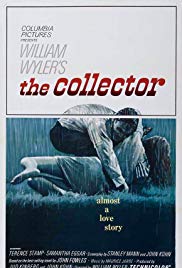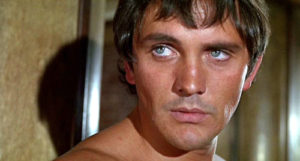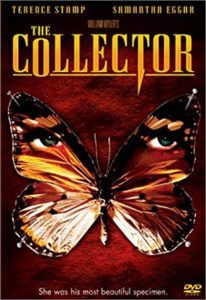The Collector **** (1965, Terence Stamp, Samantha Eggar, Mona Washbourne) – Classic Movie Review 8681
Director William Wyler’s 1965 The Collector stars Terence Stamp as a dangerously withdrawn, deranged bank clerk and butterfly collector called Freddie Clegg, who decides to collect human specimens, and abducts a young woman art student named Miranda Grey (Samantha Eggar) and incarcerates her like she belongs to his collection. He keeps her prisoner simply for perverted pleasure.
This intense and involving little suspense thriller and study in repression is based on the John Fowles novel. There is nothing particularly special acting-wise in what is basically a two-hander, but the young Stamp and Eggar do manage to make something both touching and troubling out of their screen psychopathic battle of wits.
Stamp won Best Actor at the Cannes Film Festival (1965). Eggar won the Golden Globe as Best Actress – Drama and landed an Oscar nomination as Best Actress in a Leading Role in her only Oscar nominated performance. Wyler was Oscar nominated as Best Director and Stanley Mann and John Kohn were Oscar nominated for Best Writing, Screenplay Based on Material from Another Medium. There were no Bafta awards or nominations.
The veteran Wyler handles it all quite tensely and smoothly. It was a box-office hit, and its success impressed Barbra Streisand and unexpectedly landed Wyler the direction of Funny Girl. This made up for Wyler passing on The Sound of Music to do The Collector instead.
Stamp was originally to star in Eye of the Cat (1969) when his character and the film were both called Wyler. Eventually, Michael Sarrazin played the handsome young cat hater called Wylie.
Also in the cast are Mona Washbourne as Aunt Annie, Maurice Dallimore as the Neighbour, William Beckley, Gordon Barclay and David Havilland.
Fowles said the original cut of The Collector ran for more than three hours. Kenneth More was cast as Miranda’s secret lover but suffered the ignominy of having his scenes deleted. Wyler said: ‘Some of the finest footage I ever shot wound up on the cutting room floor, including Kenneth’s part.’ More was understandably very unhappy when he found his scenes were completely cut, though claimed that he can be seen for a split second in the background of one shot.
It is shot in colour but the flashback sequence is in black and white, though originally the whole film was to be made in black and white.
Eggar beat Julie Christie, Suzanne Pleshette and Sarah Miles to win the role.
The film was cited by serial killer Bob Berdella as inspiration for his crimes.
The scene where Freddie’s neighbour comes over and Miranda tries to get his attention by flooding the bathroom is not in the book.
Hitchcock’s famous collaborator Bernard Herrmann was supposed to be the composer but Wyler hired Maurice Jarre instead, saying ‘I don’t want to use a Hitch man.’
The Jam based their song ‘The Butterfly Collector’ on this film.
Miranda walks by a cinema showing Wyler’s Ben-Hur.
The film refers to Shakespeare’s play The Tempest, in which Miranda is Prospero’s daughter. Miranda calls Freddie ‘Caliban’, the ugly misshape in the play.
This very British subject was mostly filmed in the studio in Hollywood following Columbia’s unpopular decision. A few scenes were filmed in London and Kent.
Two small cut scenes appear in the film’s trailer.
Wyler refused to let Eggar off the set during the day, didn’t want her to have anywhere to go or anyone to talk to, and would not allow her to eat with anyone else at lunch break. Wyler told Stamp: ‘I know this looks cruel, but we’re going to get a great performance out of her.’ Eggar said Wyler succeeded in making her feel defenceless, deepening her performance. Though Eggar was unhappy with Stamp’s cold treatment of her during filming, he was following Wyler’s instructions to stay in character. Stamp said: ‘I had a crush on her, too, and I was friendly with her. But when we started the movie Wyler said “I don’t want you to have anything to do with her.” He wanted me to withdraw any friendship.’
The Collector is directed by William Wyler, runs 118 minutes, is made by Collector Company and Columbia Pictures, is released by Columbia Pictures, is written by Stanley Mann and John Kohn, based on the John Fowles novel, is shot by Robert Surtees and Robert Krasker, is produced by Jud Kinberg and John Kohn and scored by Maurice Jarre.
© Derek Winnert 2019 Classic Movie Review 8681
Check out more reviews on http://derekwinnert.com




